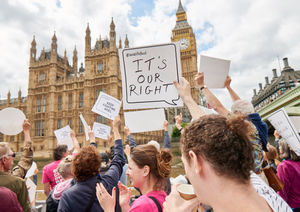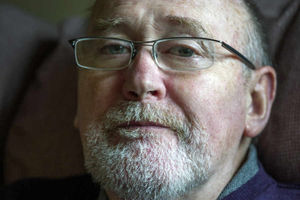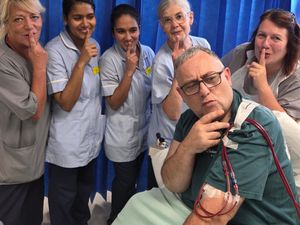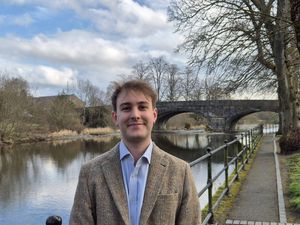Is is time to change the law on suicide?
A Shrewsbury man with an incurable disease wants the law changed on assisted dying. Dominic Robertson takes a look at the arguments.

Any British person helping another to commit suicide faces a potential 14 years in prison.
This has been the case since 1961 – but a hearing at the Royal Courts of Justice this week could pave the way for a seismic shift in assisted dying laws covering England and Wales.
And it has taken a retired lecturer from Shrewsbury to bring one of Britain's biggest moral questions to a head.
Noel Conway is likely to only have 12 months to live. And he wants to die under his own terms.
Mr Conway, 67, was diagnosed with amyotrophic lateral sclerosis (ALS), a form of motor neurone disease, in November 2014. His condition is incurable.
He wants the law changed to allow him to choose to end his own life. He has been granted a judicial review with a ruling expected later this year following the conclusion of this week's hearing. And he has gained huge support, with scores of campaigners from the Dignity in Dying campaign group taking to Westminster yesterday to support his fight in the courts.
He said: "I have lived my whole life on my own terms, in control of the choices and decisions I make. Why then, when I am facing my final months, should these rights be stripped away from me, leaving me at the mercy of a cruel illness?

"I know I am going to die anyway, but how and when should be up to me. To have the option of an assisted death available in this country would provide me and countless others with great reassurance and comfort. It would allow me to decide when I am ready to go, rather than be forced into a premature death by travelling to Dignitas at great emotional and financial cost, or to suffer a traumatic, drawn out death at home."
The issue is one which has sparked strong debate and even led to confusion, with the responsibility for any criminal prosecution resting with the Director of Public Prosecutions.
So far 92 British people are known to have travelled abroad for an assisted suicide and although none of their family members have been prosecuted for assisting them, some have been charged and have faced a considerable delay for a decision to drop the charges.
Mr Conway is seeking a declaration that the Suicide Act 1961 is incompatible with Article 8, which relates to respect for private and family life, and Article 14, which protects from discrimination.
The Department for Public Prosecutions (DPP) issued updated guidelines on whether it would proceed with a prosecution following a legal challenge by Debbie Purdy.
Mrs Purdy, who had multiple sclerosis, wanted the DPP to confirm whether her husband would face prosecution for helping her to travel to the Dignitas clinic in Switzerland to end her own life.
The guidance, which was published in 2010 indicated two factors which point towards a prosecution not being in the public interest. They were that the victim had reached a voluntary, clear, settled and informed decision to commit suicide, and that the suspect was wholly motivated by compassion.
That though is not enough for campaigners who want people's right to end their own life enshrined in law.
Celebrated author Terry Pratchett became a vocal proponent for changes to the law after being diagnosed with a rare form of Alzheimer's disease.
Mr Pratchett, who died in 2015, had suggested a tribunal to determine the facts of individual cases.
Speaking in the Richard Dimbleby lecture, 'Shaking Hands With Death' in 2010, he said: "I and others have suggested some kind of strictly non-aggressive tribunal that would establish the facts of the case well before the assisted death takes place.
"This might make some people, including me, a little uneasy as it suggests the government has the power to tell you whether you can live or die. But, that said, the government cannot sidestep the responsibility to ensure the protection of the vulnerable and we must respect that. It grieves me that those against assisted death seem to assume, as a matter of course, that those of us who support it have not thought long and hard about this very issue. It is, in fact, at the soul and centre of my argument."
He added: "I would also suggest that all those on the tribunal are over 45, by which time they may have acquired the rare gift of wisdom, because wisdom and compassion should, in this tribunal, stand side-by-side with the law. The tribunal would also have to be a check on those seeking death for reasons that reasonable people may consider trivial or transient distress. I dare say that quite a few people have contemplated death for reasons that much later seemed to them to be quite minor. If we are to live in a world where a socially acceptable "early death" can be allowed, it must be allowed as a result of careful consideration."
However, as ardent an advocate of assisted dying as Mr Pratchett was, there are equally committed opponents to changes in the law.
One such couple are Nikki Kenward and her husband Merv Aston on Clun.
64-year-old Mrs Kenward was fully paralysed by an illness for more than five months and is now in a wheelchair.
She is committed in her belief that a change to the law would open a Pandora's box where assisted suicide could become the norm.
Speaking earlier this year she said: “While assisted suicide gives people what they think is the right to die, it also gives doctors the right to kill, it will permeate into the ether and will become orthodox. We want to fight for good palliative care, at the moment it is not dealt out fairly. I know what it feels like to think ‘I must be going to die’, I can see why people are reaching for it.”
“Some people will say it was horrendous, but to say you can have euthanasia instead, what about saying you can have really good, proper care.
“I think it is a very scary world.”
Montgomeryshire MP Glyn Davies is another who has argued against any change in the law.
He has voiced concerns over the potential impact on vulnerable people feeling they do not want to be a burden on others, and has instead argued for better care for those suffering from incurable disease.
Writing on the issue Mr Davies said: "What has always concerned me is the likelihood that the normalisation of assisted suicide would lead to uncertainty about their own worth among the groups whom I have listed. It would cause them to ask questions about their own value. They would see themselves as becoming a burden on society.
"When we talk to elderly people who are nearing the end of their lives, we often find that they are concerned about not being able to leave assets to their grandchildren. I believe that that concern would be much greater if assisted suicide were legalised and thus normalised. My view is that it was and is wrong, and that only in very special circumstances, decided as it now by the Director of Public Prosecution, should those guilty of assisted suicide not be prosecuted."
One thing is for certain, no matter what the conclusion reached at the Royal Courts of Justice, the debate over the issue is sure to continue.





